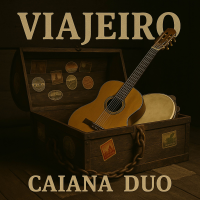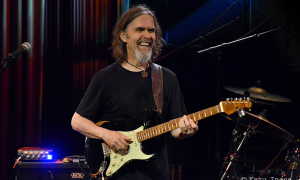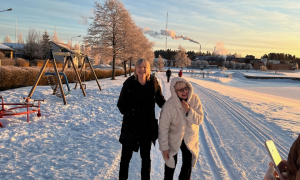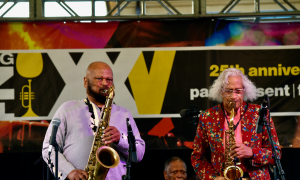Home » Jazz Articles » SoCal Jazz » Gergo Borlai: Talkin' Drummers and Drumming
Gergo Borlai: Talkin' Drummers and Drumming
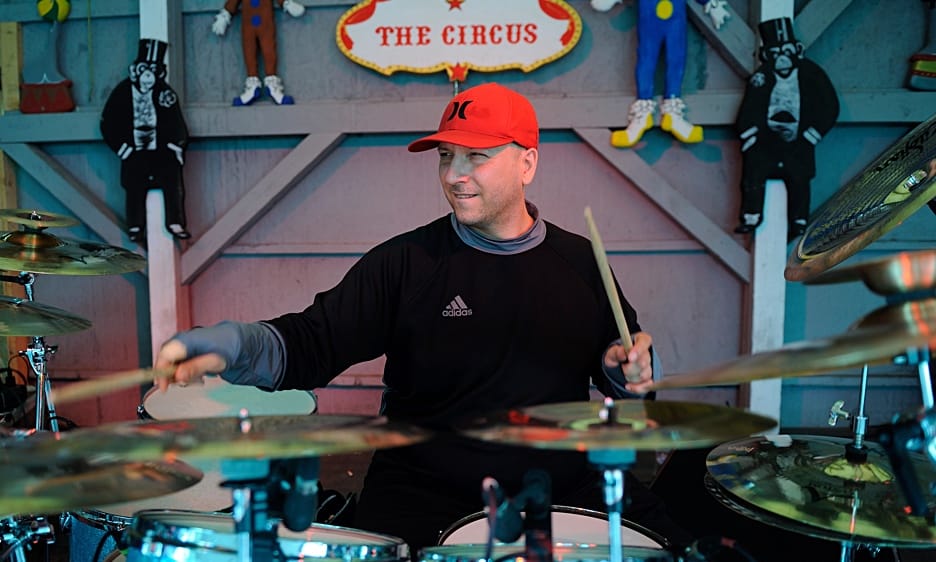
Counting kills music. I grew up with the feel of jazz, listening to my colleagues on stage. Even on a guitar solo of difficult measure, there are melodies inside the riffs. You don't need to count. Listen to the music and play the song.
—Gergo Borlai

Gergo Borlai
drumsIn this upbeat conversation Gergo gentlemanly fills the role of of the modern day drummer with aplomb. Sure, he has the skills and the tools, but its what he does with them that matters. Of the many takeaways from our enlightening conversation, the main three were listening, then of course there is listening, and not to be forgotten, listening. Listening to as much music as possible. All types of music. Listening to other drummers. And listening to your bandmates. We talked at length about his recent homage to the many drummers he most appreciates and who's influence developed his own sound.
All About Jazz: Hey Gergo, good evening (7pm in Barcelona). How's it going?
Gergo Borlai: Good morning Jim (10am in California). I'm doing well, how about you?
AAJ: Okay, just getting started. It's a beautiful morning, great weather this time of year.
GB: Oh, yes is quite nice here in Barcelona as well.
AAJ: Well, I know that it is customary in Europe to have supper later in the evening. So, this seemed a good time to chat...an appetizer (laughing).
GB: (laughing) Yes, not until around ten to ten thirty.
AAJ: You have spent a fair amount of time in America. Dinner as early as five thirty or six has to seem a bit strange.
GB: Yeah (laughing), we have lunch in the two pm to five pm range.
AAJ: Well, now that we have covered food and weather (laughing), perhaps we should move on to music.
GB: (laughing) Yes, let's do that.
AAJ: You are currently part of a big band record.
GB: Yes, I have recorded drums for the Michael Schmidt project in L.A., and also at my studio in Barcelona.
AAJ: What can you tell us about this project?
GB: Well, there are some long songs that have a lot of emotion. Many deep phrases and open solos. Some really nice arrangements. This has the Arc Trio (Borlai along with

Scott Kinsey
keyboards
Jimmy Haslip
bassb.1951
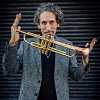
John Daversa
trumpetb.1972
AAJ: As am I. What's the biggest difference playing in a big band as opposed to trios and quartets?
GB: Particularly in playing live it is very different. I am used to playing with a lot of improvisation and having a very open feel. You don't get that so much with a big band that is tightly arranged. That's not to say I don't love doing it, because I do. It's just very different.
AAJ: You have been involved with many projects in the trio or quartet vein. What is the genesis of your major and personally tinged outing The Missing Song (Blue Canoe, 2020).
GB: The conception I had in mind was to honor nine of my favorite American drummers. All that are still alive and have greatly inspired and influenced me. I wrote original songs that I felt could have been one more song, so the missing song, from one of my favorite records of each of these amazing drummers.
AAJ: Every song is indeed titled by the first name of all of these influential drummers. It's a unique concept that you were very meticulous about.
GB: Yes, I was imitating their style but from my aspect. I set up with the same kind of kit each of them were playing at the time.
AAJ: So every song had a different drum set, a replica of what was being used on all the other songs on their albums?
GB: Yes, as much as I possibly could. Tuning the drums and setting everything up the same. Then I was able to get a feel, a vibe of what they were doing. This was also the first time I did everything myself, as far as mixing and engineering. So it was a very long process and I had much to learn along the way. It was said to me though, that no one can do it better than yourself. That only you know exactly what you want in finding that sound that is inside your head.
AAJ: You can certainly hear that vibe as you opened with "Billy." You no doubt have a big connection and even a reverence for

Billy Cobham
drumsb.1944
GB: Billy changed drumming forever. Especially at that time of the album I honor, Spectrum (Atlantic, 1973) and with the

Mahavishnu Orchestra
band / ensemble / orchestrab.1971

Steve Smith
drumsb.1954

Vinnie Colaiuta
drumsb.1956
AAJ: Your enthusiasm is contagious. Very cool, thanks for opening up like that. Now, momentarily skipping to the end, your big finish is "Vinnie." Now that is one trippy ass opening coming out of Joe's Garage (Zappa, 1979), that leads into face melting guitar riffs from

Mike Keneally
guitarGB: It's hard to pick a favorite era of Vinnie's, because he has a lot. My favorite era though, was with

Frank Zappa
guitar, electric1940 - 1993
AAJ: Yeah, I get it. You could have done something with more Vinniesque type drumming, but that doesn't tell the story that you just related.
GB: Yes, exactly. Thank you for understanding that.
AAJ: You also pay tribute to

Steve Gadd
drumsb.1945

Peter Erskine
drumsb.1954

Kirk Covington
drums
Gary Novak
drums
Dennis Chambers
drumsb.1959

Keith Carlock
drums
Terry Bozzio
drumsb.1950
GB: Steve for me is deep timing. The perfect way of laid back drumming. Even though he is a phenomenal soloist, I am dying for his groove. So my song is slower, getting into a deep groove, a deep pocket. Steve just has such musicality.
AAJ: You always know right away that it is Steve Gadd playing.
GB: Exactly, after the first note.
AAJ: And what about "Dennis?"
GB: First of all I am proud to tell you that Dennis and I are very good friends. I'll tell you a Dennis story. We were hanging in Chicago, having a really great time. I told him that I was looking for a twenty two inch Zildjian earth ride brilliant, but I could not find one. He said he would send me one. A week later my doorbell rings and there it is. So I have this beautiful earth ride with Dennis's signature below some very nice words. Dennis is a super fast drummer. On this song I got his super tight groove and amazing technical skills. Much like Billy, Dennis is a fireball, but can play sweet and slow beautifully if that is what the music needs. Here I was really focusing on his groove side.
AAJ: "Kirk" is an interesting selection.
GB: Well, Kirk Covington is one of a kind. He is also one of my closest friends. When everyone else reacts in the musically logic way, Kirk does the opposite of that. It makes him so original. He is incredible.
AAJ: That's very interesting. That completely changes the whole direction of the song.
GB: Exactly. It's quite brilliant.
AAJ: "Peter," on the other hand, an obvious choice.
GB:

Weather Report
band / ensemble / orchestra
Jaco Pastorius
bass, electric1951 - 1987
AAJ: When I have listened to and watched him play live, he is so relaxed that sometimes you think he isn't doing that much. Then you realize that he is all over the place, on top of everything. He just makes it look so easy, smiling and having a good time.
GB: Yes, it comes so naturally to him it is amazing. I saw him in Paris when we were both playing at a drum festival. I was so proud when he came over to tell me how great my brushwork was after my solo. I was so happy that Peter Erskine was telling me this. He was playing with a trio. Very soft with a lot of brushes. During the double bass solo he was swinging with his right hand on cowbell. I had never seen that before(laughing).
AAJ: He does like to have fun and be inventive. Moving along, that brings us to "Keith."
GB: Keith Carlock, yes. For me he is one of the last guys from the beat generation. He has a super jazzy touch, a super jazzy vibe, but playing aggressively in a very good musical way. I really dig his sound. Everything is so open. All these open bass drum sounds. No damper. I also love his groove based soloing. I love his vibe when he plays with um, what's the name of the guitarist?
AAJ:

Wayne Krantz
guitar, electricGB: Yes, thank you, Wayne Krantz. He is playing that contemporary music and then the next day he is playing with

Donald Fagen
piano and vocalsb.1948

Steely Dan
band / ensemble / orchestrab.1972
AAJ: How about "Gary"?
GB: Novak is a giant. Powerful, strong, complex. All of these things. He is a pioneer of sorts for me. He changed the way a lot of drummers think about the kick drum. Gary is very spontaneous and organic in his playing.
AAJ: Last, not least, is "Terry."
GB: Well, you know Zappa changed his music when he hired Terry. Frank's music was never easy, but it became super hard, super difficult when Terry Bozzio joined the band. Terry brought this big rock star look and was playing polyrhythms that nobody else was playing. He made it look real easy, but there was a lot of work behind all that. I'm crazy for Terry's drumming. He has never compromised his sound, always playing his original style of contemporary music. The song on my record is the only one I did not write. I had an open drum solo that I sent to

Alex Machacek
guitar, electricAAJ: All these original compositions with a different drummer at the center of each, had to be both fun and a series of interesting challenges.
GB: Yes, I grew up on their music so it was kind of natural in a way. All of their music is in my blood. It was one hundred percent joy to work on this album.
AAJ: Going another direction, you started playing the drums at a very early age, correct?
GB: Yes, I was three.
AAJ: I would say that's pretty early.
GB: I remember that moment actually.
AAJ: Do you? Not everyone can remember that far back.
GB: Yes. My parents were both sound engineers for the national Hungary radio station. With the communist system we weren't able to get that much music from the western culture. My father played the guitar and was able to bring home some good vinyl albums. He brought home a

Dave Brubeck
piano1920 - 2012

Joe Morello
drums1928 - 2011
AAJ: Born and raised in Budapest, what was it like learning and listening to music in Hungary at that time?
GB: I started getting lessons when I was five. I was very lucky and had great teachers. Many have gone on to great successful careers as musicians. In 1990, when I was only twelve, I started playing in a band. The good thing is that I was really able to play. It wasn't some circus style seeing a kid on the drums. They were using me as a musician. I was humbled and really had to concentrate on it. It was the best school I ever got.
AAJ: You were in a sink or swim situation. Sometimes that can be a really good thing.
GB: Absolutely, yes. When I was sixteen I started touring with them. I had played on thirty or forty records by the age of sixteen. By eighteen or nineteen I was one of the top called studio drummers. I learned so much early in life. I am so thankful for all that.
AAJ: You now reside at least part of the time in Barcelona.
GB: Yes, we moved to Barcelona thirteen years ago. Then moved to Los Angeles six years ago. We are back in Barcelona for the time. With the pandemic there is nothing going on in L.A. so there is no reason to be there. It is much more affordable here in Barcelona. Thanks to the internet I still have lots of things to do. Recording sessions and Skype lessons and some other things.
AAJ: The pandemic has sure cost us all a lot of great tours that were scheduled.
GB: Oh my gosh. I was just going to start a two month tour with

Frank Gambale
guitarb.1958

George Whitty
keyboardsAAJ: Man, that would have been outstanding.
GB: Yes and I had other tours lined up after that.
AAJ: You have already bowed down to the greatness of Frank Zappa. What other artists were you listening to that have influenced or inspired you?
AAJ: I was a music listening nerd. I became really addicted to it. I may have listened to too much music.
AAJ: Is that actually possible?(laughing)
GB: (laughing) Only in that sometimes it kept me from doing something else I was supposed to be doing. You know, the schoolwork. I wasn't in to that(laughing). I was a jazz nerd.

Miles Davis
trumpet1926 - 1991

John Coltrane
saxophone1926 - 1967

Ornette Coleman
saxophone, alto1930 - 2015

Paul Motian
drums1931 - 2011
AAJ: That's a shame. Very likely could have happened. But still a great experience learning all those songs. Showed a lot of dedication and just how much you love that music.
GB: Yes, I played a show at the Baked Potato with
Jamie Kime
guitar
Matt Rohde
keyboardsAAJ: There are several well-known names listed that you have played with. Just to pull a couple that intrigue me...first of all, Al DiMeola. I'm a huge fan of his music. When and on what did you play with him?
GB: We played at a big art exhibition at the national museum in Hungary. I was there with a percussionist and we had the opportunity to play with him. The museum wasn't the best place for sound with long open spaces. A lot of reverb. We had to play very softly. It was a very special moment that I am very proud of. Both in the way that we adapted and, of course, the privilege of playing with Al. He is such an amazing talent.
AAJ: Another name that jumped out at me was

Hiram Bullock
guitar, electric1955 - 2008
GB: I played with a Hungarian singer that sounded a lot like

Ray Charles
piano and vocals1930 - 2004
AAJ: That would seem a no brainer.
GB: Yes, for sure. I was very excited. But then he died.
AAJ: It's hard to believe that it's been over twelve years since he passed away. Such a dynamic guitarist with all that funk poured into the jazz and fusion. I was fortunate to see him play several times. Mostly with

David Sanborn
saxophone1945 - 2024

Marcus Miller
bassb.1959

Omar Hakim
drumsb.1959
GB: Oh yes. All so great. As a drummer, Marcus is a special player.
AAJ: Well, that brings me to something else I was going to ask you about. Obviously there is the strong drummer and bassist rhythm section relationship going on. But you are way beyond that in your love and interest of the bass.
GB: I have ten bass guitars. Back in the day I had maybe two thousand CDs. So many of them were by bassists. All the great bassists. I love the bass. I love to play it. I don't play it all that well(laughing), but I love to do it. I compose a lot on the bass. I started learning the bass way back when I started playing the drums as a kid.
AAJ: Oh, well that has given you a big leg up on the rhythm connection and feel.
GB: It's true, yes. I know what register sounds good and have a really good feel for it.
AAJ: Speaking of feel, that's what it is all about for you.You go by feel, with no count off or metronome when you play. Why is that? Or how did that evolve?
GB: Well, as a musician, I am a listener and a watcher. I grew up with the feel of jazz. That is very much part of me. I like listening to my colleagues on stage. Even if it is a big band, I like to have everything on my monitor. I want to know what is going on everywhere. For me it's about learning the music so completely that you don't need to be thinking about it. To just be able to play it naturally.
AAJ: That would seem to open the door for more improvisation, or perhaps richer improvisation.
GB: Yes. In many ways counting kills music. If I am playing along with a guitar solo, even one of difficult measure, there are melodies inside the riffs. You don't need to count, you need to listen to the music and play the song.
AAJ: I've heard that said before, to "just play the song." That sometimes it can be made to be more difficult and complex than it needs to be.
GB: I believe so, yes.
AAJ: You would seem to be project driven, wanting to play new and fresh ideas, as opposed to wanting the safety net of a steady gig. Is that a fair assessment?
GB: You are totally right, yes. I like to play with everybody and anybody. That's one of the great things about L.A.---except not now during the pandemic. Usually there are many people to play with and places to play. I know that the Blue Whale has closed, and the Baked Potato. I haven't heard anything about the Catalina.
AAJ: Sorry to say that The Catalina Jazz Club is dormant as well.
GB: When I first moved to L.A. my dream was to play with all of these cats that I had grown up listening to. All of them. I ended up playing with Scott Kinsey,
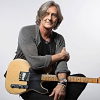
Allen Hinds
guitar
Vinnie Colaiuta
drumsb.1956
AAJ: Well, it's great that you can take that all in and truly be in the moment, appreciating both the fun and the challenge.
GB: Absolutely. I never forget the moments. Just seeing myself around guys like

Tom Scott
saxophone, tenorb.1948

Nathan East
bassAAJ: You mentioned the Arc Trio with Jimmy Haslip and Scott Kinsey, as the core of the upcoming big band record. The actual Arc Trio (Blue Canoe, 2019) record is some intriguingly dense fusion. How did that connection come together?
GB: This was all Jimmy's idea. Scott, Jimmy, and I had been playing a lot together and doing some things in the studio. We played some long free sessions and out of that we discovered or created melodies that we could openly play around. There was so much freedom in the way this was recorded. We were all able to stretch but in a way that we stayed very connected to each other. Yes I very much enjoyed the process, the way we recorded this. I think the record came out real well.
AAJ: Your admirable humility prevents you from "beating your own drum." However, the dynamics of this record are best not brushed aside.
GB: Thank you for that, Jimmie. You are most kind.
AAJ: The rumor mill has a follow up in mind. Might there be an Arc Trio 2 or whatever you might call it?
GB: I spoke to Jimmy about a week ago. I do believe it will happen and perhaps soon. I, myself, have written about thirty songs. Scott and Jimmy are both excellent composers, so we have plenty of material.
AAJ: Outstanding news! You have also played a lot with, and seem to have a very natural connection with

Gary Willis
bassb.1957

Scott Henderson
guitarGB: Yes, I have toured with Henderson, Kinsey, and
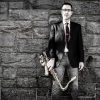
Matt Garrison
saxophoneAAJ: Yeah, clear your head, save it, and have it be fresh. I can see where that makes a lot of sense.
GB: Yes, I think so. Gary Willis lives here in Barcelona. He has lived here for about twenty years now.
AAJ: Well, that's real convenient for you(laughing).
GB: (laughing) Yes, and actually Frank Gambale moved here just a couple of months ago.
AAJ: You've got a whole band there(laughing).
GB: A power trio, yes(laughing). Gary Willis is one of a kind, though. His way of composing is so special. I just talked to him today. We are always working on something together. We have recorded three albums together under his name. These guys are a lot of fun to play with and, yes, it is all very natural.
AAJ: With the pandemic and no live gigs, what have you mostly been doing to stay busy and focused?
GB: I have been writing so many songs. Sometimes even two or three a day. I have enough for three or four records, whether they are mine or for someone else. In over twenty years in the business I have never had time to really sit down and compose like this.
AAJ: Yes, in talking to people it seems that in the near future we are going to be feasting on a big platter of new music. One positive to come out of an otherwise extremely difficult and gloomy situation. In swinging the pendulum back to the positive, you have got to tell me about Sausage (Tom-Tom Records, 2004). That's a very different record. What was the concept on that?
GB: (laughing) Many things. It was my first attempt at writing on the computer, which was limitless and genre void. I also wrote some of the songs on a bass guitar. It was an easy flat and funny album that was anywhere from jazz to heavy metal. No limits, it just came out. But, too, there was another record in between Sausage and the current The Missing Song, called M.M.M. (Self Produced, 2009).
AAJ: Indeed, that was going to be my next question. What's the skinny on that one?
GB: Well it stands for Music, Meinl, Messe. I got involved with Meinl Cymbals and they set me up to play at the Musikmesse in Frankfurt(the European counterpart of the NAMM show). I played there for three days, five hours a day, in their booth. Meinl was my first ever endorsement deal. It came late, compared to these days, I was thirty years old. It was a big challenge to do an international presentation like that. So, the album is the pure power of fusion from inside me. Fusion is a good thing(laughing).
AAJ: I won't disagree with that(laughing). That seems like a good thought to finish up on. I look forward to seeing you back in L.A. and hearing you play some live fusion—hopefully sooner than later.
GB: Oh yes I hope so too. I miss it so much. I miss my friends like Jimmy and Scott and many others. I miss playing the gigs. L.A. always has so much going on. There is always a place to play. I miss it all very much. So hopefully soon, as you say.
AAJ: It can't come soon enough. Hey man, I really enjoyed talking with you, Gergo. Thanks for the visit.
GB: It was my honor, Jim, to talk with you. There is nothing better than talking music with a good person. I really enjoyed it, Jim.
AAJ: Right back at you, Gergo. Take care.
Tags
SoCal Jazz
Gergo Borlai
Jim Worsley
Spain
Barcelona
Scott Kinsey
Jimmy Haslip
John Daversa
Billy Cobham
Mahavishnu Orchestra
Steve Smith
Vinnie Colaiuta
Mike Keneally
Frank Zappa
Steve Gadd
Peter Erskine
Kirk Covington
Gary Novak
Dennis Chambers
Keith Carlock
Terry Bozzio
Weather Report
Jaco Pastorius
Wayne Krantz
Donald Fagen
steely dan
Alex Machacek
Dave Brubeck
Joe Morello
Frank Gambale
George Whitty
Miles Davis
John Coltrane
Ornette Coleman
Paul Motian
Jamie Kime
Matt Rohde
Peter Griffin
Al DiMeola
Hiram Bullock
Ray Charles
David Sanborn
Marcus Miller
Omar Hakim
Allen Hinds
Tom Scott
Nathan East
Gary Willis
Scott Henderson
Matt Garrison
Comments
PREVIOUS / NEXT
Support All About Jazz
 All About Jazz has been a pillar of jazz since 1995, championing it as an art form and, more importantly, supporting the musicians who make it. Our enduring commitment has made "AAJ" one of the most culturally important websites of its kind, read by hundreds of thousands of fans, musicians and industry figures every month.
All About Jazz has been a pillar of jazz since 1995, championing it as an art form and, more importantly, supporting the musicians who make it. Our enduring commitment has made "AAJ" one of the most culturally important websites of its kind, read by hundreds of thousands of fans, musicians and industry figures every month.
Go Ad Free!
To maintain our platform while developing new means to foster jazz discovery and connectivity, we need your help. You can become a sustaining member for as little as $20 and in return, we'll immediately hide those pesky ads plus provide access to future articles for a full year. This winning combination vastly improves your AAJ experience and allow us to vigorously build on the pioneering work we first started in 1995. So enjoy an ad-free AAJ experience and help us remain a positive beacon for jazz by making a donation today.

Barcelona
Concert Guide | Venue Guide | Local Businesses
| More...








 Buy Now
Buy Now

